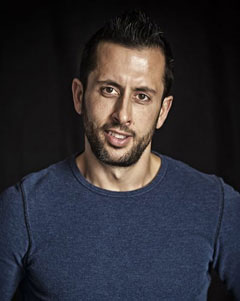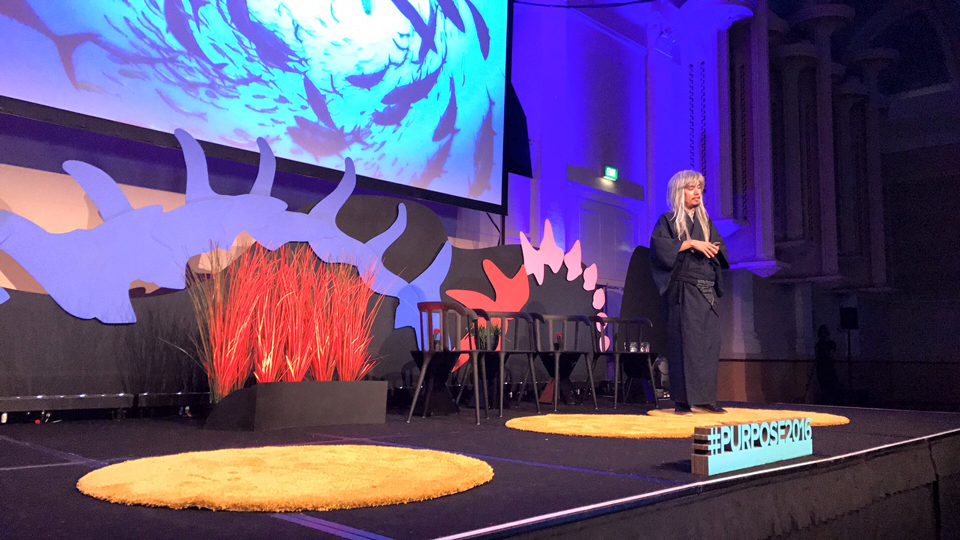
This week I was totally immersed in an area of passion and importance to me. It was the Purpose conference put on by Sally Hill and the amazing team at Wildwon, in Paddington, Sydney.
Two full days of awesomeness that has pumped me up, and I want to share what I experienced with you and the gems I have taken from it. To do it justice I am splitting it into two parts (and for ease of consumption) .
Both days were filled with great speakers, thought provoking ideas and inspiring purpose lead businesses. Some, as small sole founder startups. Others, large players in the corporate sphere. The commonality, a philosophy that business should be more about people and purpose than profit.
With a wide menu of breakout talks and workshops spread across the Paddington Town Hall and its amazingly cool surrounding precinct, there was something for everyone. And difficult decisions to what to leave out.
Here is how Day one transpired for me, and the main takeaways.
Session One – Cathedral Thinking
Matt Wicking, the host of the event, masterfully entertained us with his wit and humour quickly shaking the nerves off in front of the 450 strong crowd.
To set the stage we were taken on an enlightening exploration of time with none other than Dr. Time, a self professed ancient Chinese hipster in a blond wig. The journey ending in time’s Ancient Greek dual meaning, Kronos and Kairos. The first referring to the clock and units of measurement, and the latter referring to the moment – qualitative rather than quantitative. With an exercise in bridging the two.
Chris Halburd of Skinner and Associates gave great context to the multi generation spanning nature of medieval cathedral building. One taking more than 700 years to build. With such a long term project view, sustainability is paramount. In one instance, an Oak grove was purchased to supply the future need to replace the wooden beams several decades later. That’s long term thinking!
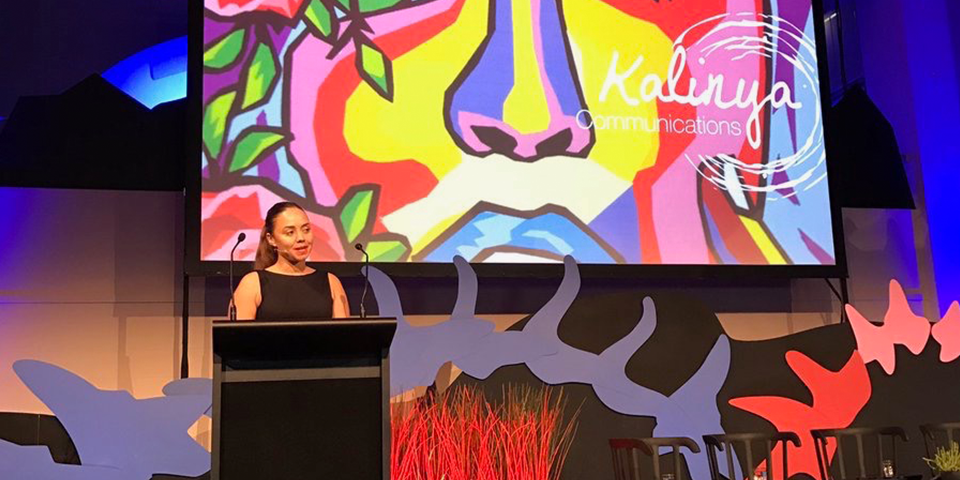
Geoff Manchester talked through his experiences growing and leading Intrepid travel and the difficult decisions that have to be made to stay on purpose. One shared was their decision to end elephant rides, in the face of it being on many travelers’ bucket list. What they learned was brave decisions pay off, this one causing a tidal wave of positive PR and social sharing.
My takeaways from this session:
- Shifting to long term thinking, creates legacy thinking, and leads to decisions that are based on sustainability, not short term gain.
- It is human nature for people and the land to be fundamental drivers in life and business, and it has only been veiled by corporate drives for short term gains for shareholder maximization.
- The hard decisions are usually the right ones, and they come with rewards.
Session 2 – New Kids On The Block (Breakout)
An inspiring and raw session hosted by Cass Mao, with startups looking to change the world (my people!). We heard from Eva MacKinley from The Last Straw, seeking to eliminate the 500,000,000 plastic straws senselessly being served up in most drinks, only to end up in landfill. She shared the challenges in selling an idea.
Karina Seljak of Seljak Brand introduced us to her beautiful blankets, transformed from discarded wool. With a view to scaling to fit a larger demand from decommissioned corporate uniforms and the challenges that come with that.
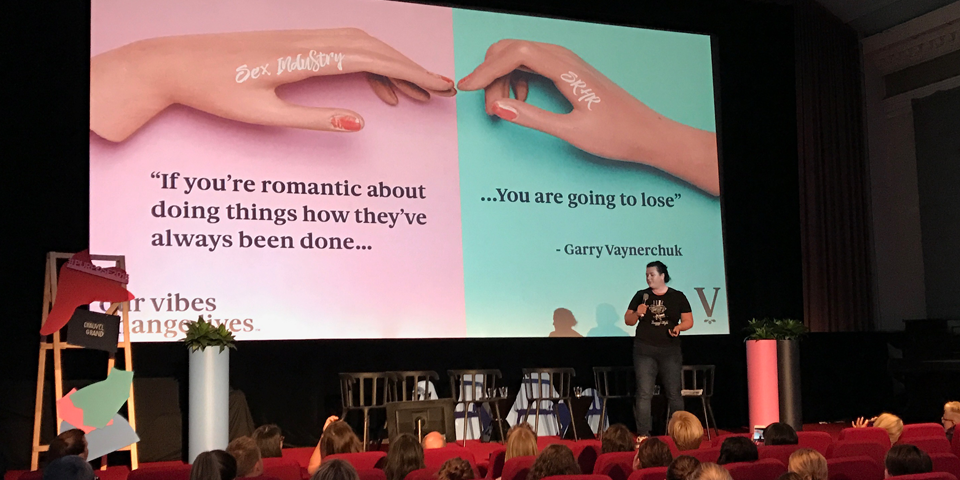
April Crawford-Smith and Tom Nockolds from Pingala closed out the session sharing their community cooperative business model of solar farms in city environments. They spoke about the evolution of their model, the lessons they learned, and how creating small shareholdings in their projects connects businesses to their community. Amazing and inspiring stuff from brave social entrepreneurs!
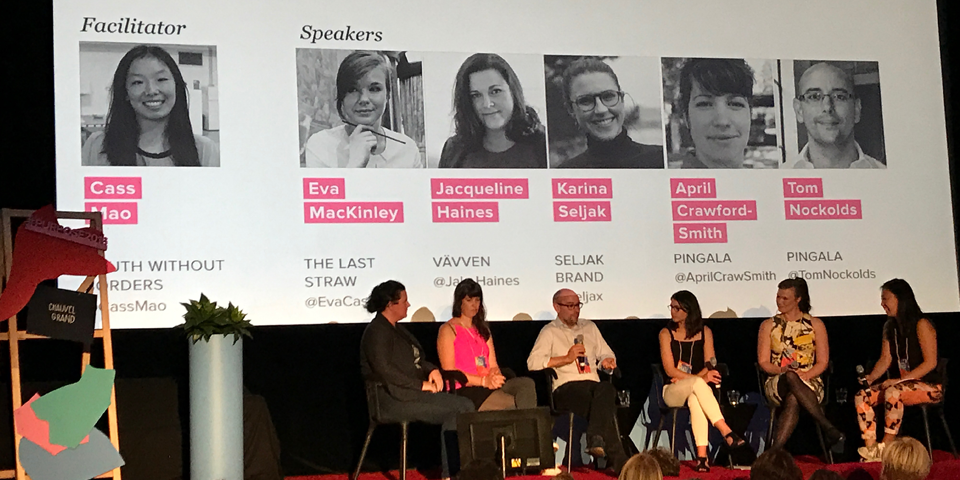
Session takeaways:
- There are accepted norms which cause so much environmental damage through landfill.
- Selling an idea can be challenging!
- People really want to know the story of where the things they buy come from.
- Build partnerships with your community as stakeholders.
Session 3 – Meaning and the Millennial Mindset
Susie Bayes from The Guardian masterfully moderated this millennial focused session and took us through some insightful stats (somewhat frightening for many). Some standout points for me were:
- 66% of millennials are planning their career break up
- 3 in 4 are happy to pay for things with a positive social impact
If you don’t have meaning for millennials in your business culture, or your product or service, you have overwhelming odds of losing them.
Natasha Ritz from Lush shared the inverted pyramid model for their business which places the customer (including their teams) at the widest and most largest part. And how communicating real and raw stories featuring their own people via their window marketing connects with the customers and goes viral for them. In other words: Stop campaigning and start communicating!
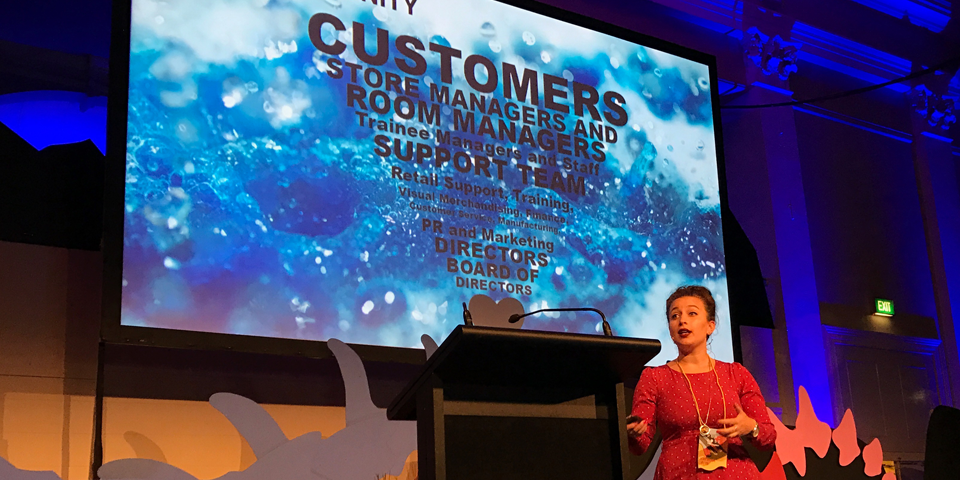
Will Richardson talked about his journey from corporate to social impact investment with the Impact Investment Group, and how important it is to find your tribe. With values based consumption here to stay, impact investment is growing, and doing good things.
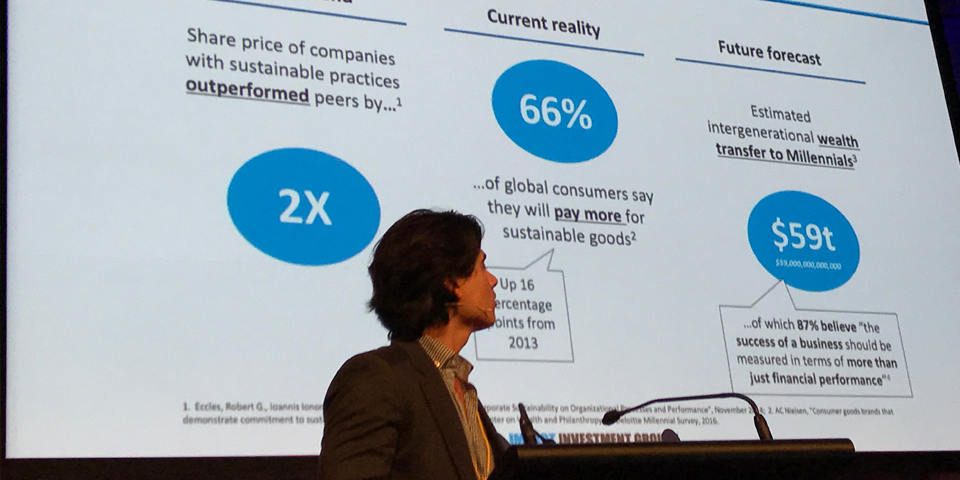
Will also shared his incredible light bulb moment. Falling unconscious off a stool after labeling how he felt about his current state (in his prior corporate role) as being “dead”. A powerful subconscious message indeed!
Young Henrys’ Andy Miller gave us their story and how connection with the customer is at the heart of their business. Success metrics for them is the number of stoked customers at festivals and high fives. And with marketing, no content plan, rather connection and partnerships with locals being the driver.
Of course, great craftsmanship, and industry stewardship being fundamentals for them too.
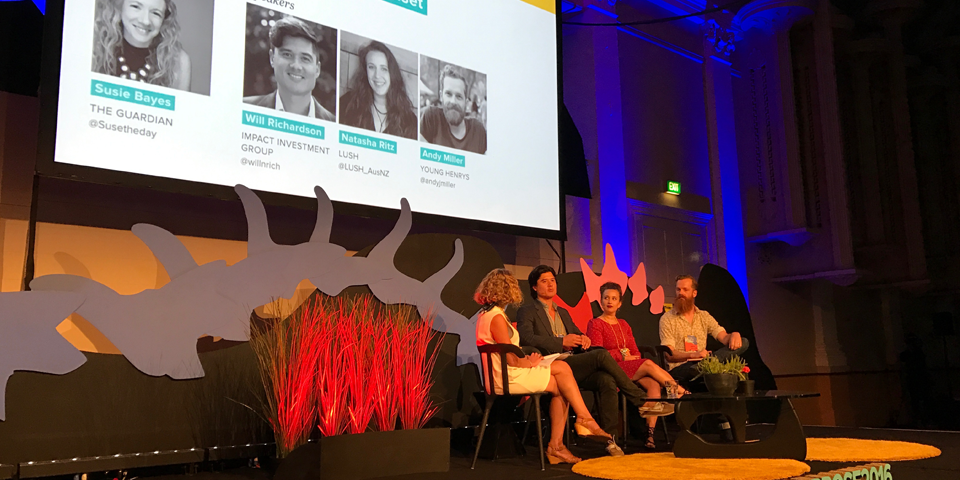
My key takeaways from this session were:
- If something isn’t clearly a “f*#k yes”, don’t do it, because it is a “f*#k no”. Courtesy of Natasha from Lush
- Find your tribe, connect and communicate with them. Become mates.
- Millennials want to be heard – more than everyone else. So let them be heard. Give them a way to share their opinion.
Last session of Day 1 – The Purpose Paradox.
Michael Bradley from revolutionary Sydney law firm Marque Lawyers kicked it off, back after demand from Purpose 2015. He shared Marque’s startup story, originating from the desire to be great lawyers, but being people first. Profits have come because they have focused on purpose.
The Purpose Paradox as Michael says “1. It works. 2. It’s really f#*king hard!”
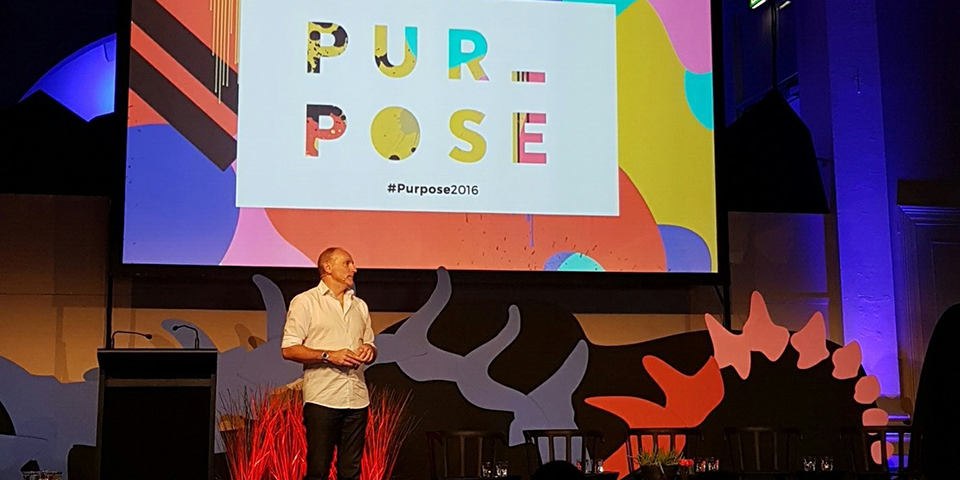
With a team of 40 now, significantly more than the original 8 who shaped their values and purpose, the challenge is how to ensure the purpose is relevant and remains so, for the company as it grows.
Note: This is an area that particularly interests me and I look forward to observing and learning more about Marque’s journey.
Andy Lark took the energy up a few notches with his talk on purpose led businesses leading the way today in value. He believes the tipping point has already been passed and many corporations have been left in the dust. Profit not being the measure of value in many cases. Amazon for example, the world’s most valuable company, not from turning a profit, but rather, from being purpose lead. And in his own experience with Xero not making a profit, but making many people quite wealthy due to the value created out of its purpose.
Ed McManus from Powershop (disclaimer – I moved to Powershop a short time ago due to discovering them during my B-Corp assessment), talked about the driving influences that have shaped large corporations. Most notably Milton Friedman with his 1971 seminal study on shareholder maximization. This has lead to short term decisions being made to maximise profits at the expense of all else, for the gain of shareholders.
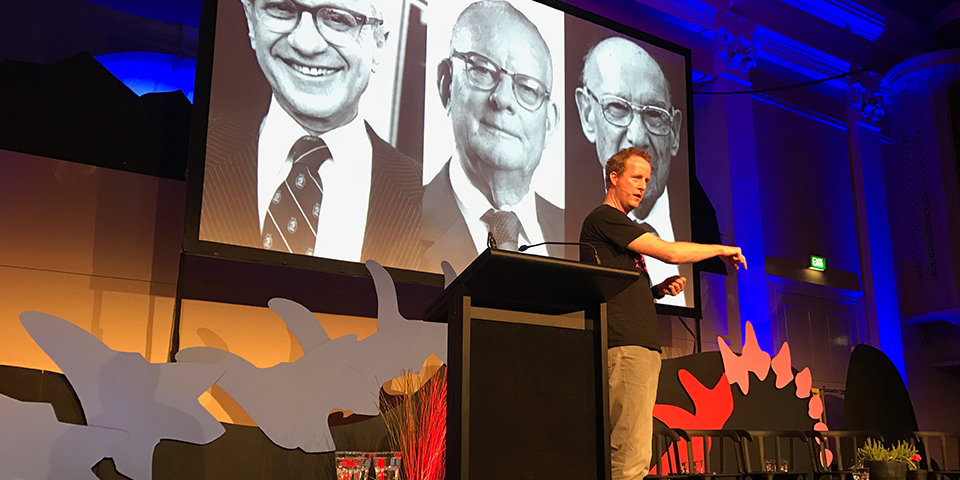
The Powershop model is about helping the customer spend less, with transparency, and leveraging technology. He shared that they have no kpis, as he believes it destroys the company, by not making it about entirely about the customer.
Tracey Conlan from EY shared insights from her experience with large corporations seeking help from them to understand purpose. And the mammoth challenges involved with companies of 65,000 staff. One company taking 6 years to get through the third level of management.
The key to successful change in her opinion is creating ways to authentically live out the new purpose in the day to day aspects of work life.
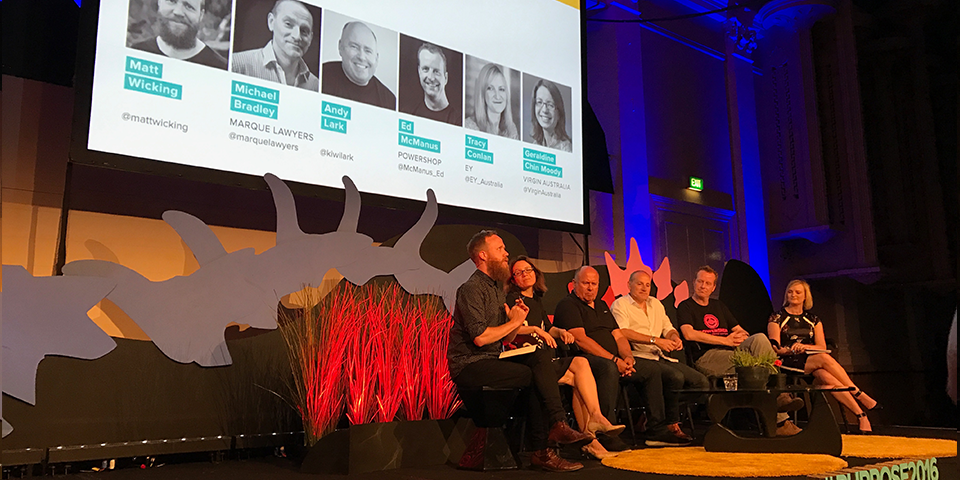
The wrap up with the panel included Virgin Australia’s Geraldine Chin Moodywho answered the question of how to keep purpose in a large organisation. For them it is easy as Richard Branson’s purpose of disruption and competition is in their DNA.
My main takeaways from this session were:
- Focus on Purpose and Profit will follow. Even if It’s really f#*king hard!
- Purpose is more valuable than short term profits – Amazon, Facebook and Google prove this.
- It is a constant challenge to lead with purpose, and critical to have your people aligned with it.
That marks the end of first day of Purpose. It was my experience and take only, I am sure others got great insights that I missed and I would love to hear them, so please share with me.
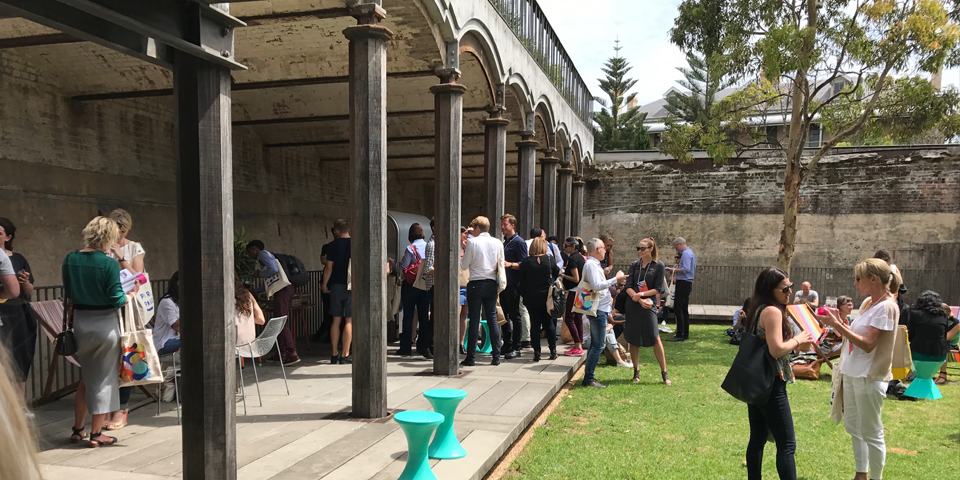
Stay tuned for my recap of day two.
Yours in Purpose
Luke Faccini
P.S. I love chatting about this kind of stuff so connect and start a conversation.
